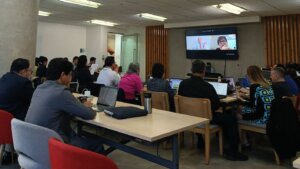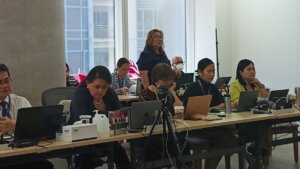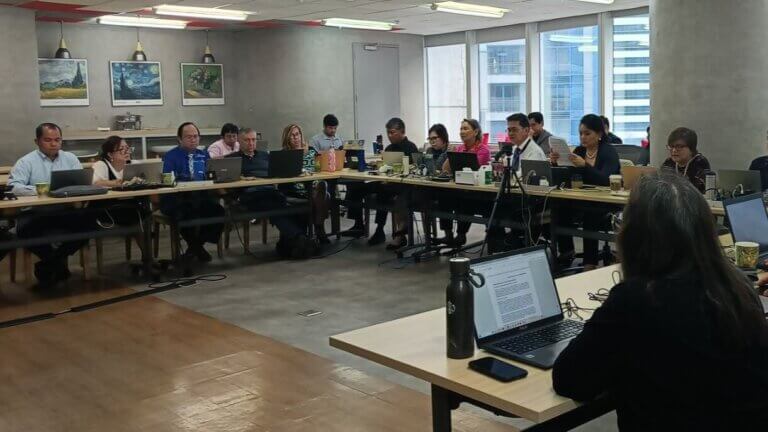The eighth session of our Executive MBA program focused on a topic that’s more relevant than ever: cybersecurity in the age of AI. The need for strong cybersecurity in businesses is critical. In today’s digital age, where technology underpins nearly every aspect of operations, cybersecurity protects a business’s most valuable assets—its data, intellectual property, and customer trust.
The cyber threat landscape evolves rapidly, with new attack vectors emerging at an unprecedented pace. Organizations must adopt a proactive approach to cybersecurity. It’s not just a technical requirement that can be treated as an afterthought; cybersecurity must be a foundational element of any modern business strategy.
Who can forget how our world changed overnight during the pandemic? Many employees were required to work from home, which expanded the “attack surface.” Cyber threats could appear anywhere and at any time. Companies that had prioritized cybersecurity were better positioned to survive. For example, when the pandemic hit Manila, John Clements Consultants Inc. had already established a strong cybersecurity foundation. We had trained all employees and moved our computing infrastructure to the cloud. This preparation allowed JCCI to transition quickly to a work-from-home business model.

The Darktrace Case Study
Darktrace was the first cybersecurity company to use AI and machine learning to identify and neutralize online threats in real time. Its AI learns from an organization’s unique data to understand what is normal, enabling it to detect subtle deviations that signal a threat—including novel and AI-driven cyberattacks. The AI can identify high-risk, anomalous activity across various domains such as network, email, cloud, and endpoint, without relying on signatures, rules, or threat intelligence.
Darktrace’s AI can then autonomously respond to both known and unknown threats in real time, taking targeted actions without disrupting business operations. It works across the entire digital ecosystem of an organization, tracking the full scope of every incident from email, network, and cloud applications to endpoint devices and operational technology. These features make Darktrace’s AI technology a powerful tool for enhancing cybersecurity and protecting organizations from evolving threats.
As part of the case study, we examined the organizational challenges faced by Darktrace in 2022, when two of its co-founders, Emily Orton (CMO) and Nick Trim (CRO), decided to step down from their roles. The company considered various strategies to fill these positions, which could impact its culture, hiring model, and compensation structure. It was a highly interactive and engaging discussion as the team of senior executive search consultants from JCCI explored the dynamics of this case.
The Role of AI in Cybersecurity
In the early days of cybersecurity, there was heavy reliance on “signature files.” These files contained predefined descriptions of known viruses. Antivirus tools would analyze files and compare them to stored signatures to detect malware or attacks. This process is like a security checkpoint, where images of potential intruders are displayed. Security personnel then check incoming visitors against these images to decide who can enter.
Today’s cybersecurity tools use AI to gain insights into an organization’s behavior. This enables a more proactive approach. For example, if an employee displayed suspicious behavior upon arriving at the office, measures could be implemented to prevent them from being coerced into harmful actions—or to stop an impostor from launching a cyberattack. Similarly, if a visitor exhibited unusual behavior, alerts could be triggered automatically. This eliminates the need to compare the visitor to a list of known intruders.
More advanced tools go beyond detection and offer proactive responses. AI agents can take action without human intervention. Some tools even send alerts to a Managed Security Operations Center (MSOC)—a 24/7 monitoring station. When alarms are triggered, the MSOC can notify security personnel, allowing them to defuse threats and prevent their spread.
What Should Your Company Do?
- Protect Sensitive Information: Businesses handle vast amounts of confidential data, such as customer records, financial information, and trade secrets. A breach could lead to financial losses, legal repercussions, and reputational damage.
- Mitigate Financial Risks: Cyberattacks can result in significant costs, from ransom payments to recovery expenses and lost revenue during downtime. Preventive measures are far more cost-effective than responding to a breach.
- Build Customer Trust: Consumers are becoming increasingly aware of data privacy and security. A robust cybersecurity framework reassures clients and customers that their information is safe.
- Comply with Regulations: Many industries require adherence to strict cybersecurity standards (e.g., GDPR, HIPAA). Failure to comply can result in hefty fines and legal challenges.
- Combat Sophisticated Threats: Cybercriminals continually evolve their methods, employing AI-driven attacks, phishing schemes, and ransomware. Businesses must stay a step ahead to defend against these threats.
- Preserve Business Continuity: Cyber disruptions can grind operations to a halt. A proactive approach ensures that businesses can continue running smoothly despite potential attacks.

Achieving these goals involves continuously assessing security risks, implementing the latest defense technologies, and fostering a security-first mindset across all departments.
Partnering with skilled cybersecurity professionals ensures that businesses stay ahead of potential threats. Experts can conduct regular vulnerability assessments, develop incident response plans, and enforce compliance with industry regulations. Moreover, ongoing training and awareness programs help employees recognize and prevent common cyber threats like phishing and social engineering attacks.
How Can John Clements Consultants Help?
John Clements Consultants helps businesses build a formidable cybersecurity workforce by sourcing and providing access to professionals skilled in security risk management, threat detection, and incident response.
Businesses must take decisive action to protect their digital assets. With the right talent in place, organizations safeguard their information and fortify their reputation, ensuring they remain resilient in the face of cyber adversity.
Secure Your Business Today
Don’t leave your digital assets vulnerable to attack. Act now and take charge of your cybersecurity future by leveraging the exceptional talent John Clements offers. Your business’s reputation, financial welfare, and operational integrity depend on it.
Employing skilled cybersecurity professionals as part of an organization’s defense strategy is a proactive measure. This move allows businesses to anticipate potential threats, implement robust security frameworks, and maintain a vigilant posture against would-be attackers in an ever-changing threat landscape.
Browse our website to learn more about our cybersecurity talents for hire.





